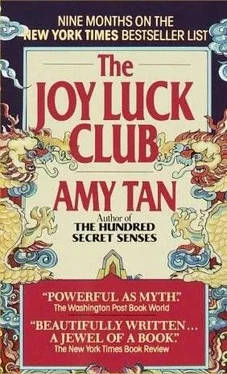That's it. I keep thinking the others will start talking about my mother, the wonderful friendship they shared, and why I am here in her spirit, to be the fourth corner and carry on the idea my mother came up with on a hot day in Kweilin.
But everybody just nods to approve the minutes. Even my father's head bobs up and down routinely. And it seems to me my mother's life has been shelved for new business.
Auntie An-mei heaves herself up from the table and moves slowly to the kitchen to prepare the food. And Auntie Lin, my mother's best friend, moves to the turquoise sofa, crosses her arms, and watches the men still seated at the table. Auntie Ying, who seems to shrink even more every time I see her, reaches into her knitting bag and pulls out the start of a tiny blue sweater.
The Joy Luck uncles begin to talk about stocks they are interested in buying. Uncle Jack, who is Auntie Ying's younger brother, is very keen on a company that mines gold in Canada.
"It's a great hedge on inflation," he says with authority. He speaks the best English, almost accentless. I think my mother's English was the worst, but she always thought her Chinese was the best. She spoke Mandarin slightly blurred with a Shanghai dialect.
"Weren't we going to play mah jong tonight?" I whisper loudly to Auntie Ying, who's slightly deaf.
"Later," she says, "after midnight."
"Ladies, are you at this meeting or not?" says Uncle George. After everybody votes unanimously for the Canada gold stock, I go into the kitchen to ask Auntie An-mei why the Joy Luck Club started investing in stocks.
"We used to play mah jong, winner take all. But the same people were always winning, the same people always losing," she says. She is stuffing wonton, one chopstick jab of gingery meat dabbed onto a thin skin and then a single fluid turn with her hand that seals the skin into the shape of a tiny nurse's cap. "You can't have luck when someone else has skill. So long time ago, we decided to invest in the stock market. There's no skill in that. Even your mother agreed."
Auntie An-mei takes count of the tray in front of her. She's already made five rows of eight wonton each. "Forty wonton, eight people, ten each, five row more," she says aloud to herself, and then continues stuffing. "We got smart. Now we can all win and lose equally. We can have stock market luck. And we can play mah jong for fun, just for a few dollars, winner take all. Losers take home leftovers! So everyone can have some joy. Smart-hanh?"
I watch Auntie An-mei make more wonton. She has quick, expert fingers. She doesn't have to think about what she is doing. That's what my mother used to complain about, that Auntie An-mei never thought about what she was doing.
"She's not stupid," said my mother on one occasion, "but she has no spine. Last week, I had a good idea for her. I said to her, Let's go to the consulate and ask for papers for your brother. And she almost wanted to drop her things and go right then. But later she talked to someone. Who knows who? And that person told her she can get her brother in bad trouble in China. That person said FBI will put her on a list and give her trouble in the U.S. the rest of her life. That person said, You ask for a house loan and they say no loan, because your brother is a communist. I said, You already have a house! But still she was scared.
"Aunti An-mei runs this way and that," said my mother, "and she doesn't know why."
As I watch Auntie An-mei, I see a short bent woman in her seventies, with a heavy bosom and thin, shapeless legs. She has the flattened soft fingertips of an old woman. I wonder what Auntie An-mei did to inspire a lifelong stream of criticism from my mother. Then again, it seemed my mother was always displeased with all her friends, with me, and even with my father. Something was always missing. Something always needed improving. Something was not in balance. This one or that had too much of one element, not enough of another.
The elements were from my mother's own version of organic chemistry. Each person is made of five elements, she told me.
Too much fire and you had a bad temper. That was like my father, whom my mother always criticized for his cigarette habit and who always shouted back that she should keep her thoughts to herself. I think he now feels guilty that he didn't let my mother speak her mind.
Too little wood and you bent too quickly to listen to other people's ideas, unable to stand on your own. This was like my Auntie An-mei.
Too much water and you flowed in too many directions, like myself, for having started half a degree in biology, then half a degree in art, and then finishing neither when I went off to work for a small ad agency as a secretary, later becoming a copywriter.
I used to dismiss her criticisms as just more of her Chinese superstitions, beliefs that conveniently fit the circumstances. In my twenties, while taking Introduction to Psychology, I tried to tell her why she shouldn't criticize so much, why it didn't lead to a healthy learning environment.
"There's a school of thought," I said, "that parents shouldn't criticize children. They should encourage instead. You know, people rise to other people's expectations. And when you criticize, it just means you're expecting failure."
"That's the trouble," my mother said. "You never rise. Lazy to get up. Lazy to rise to expectations."
"Time to eat," Auntie An-mei happily announces, bringing out a steaming pot of the wonton she was just wrapping. There are piles of food on the table, served buffet style, just like at the Kweilin feasts. My father is digging into the chow mein, which still sits in an oversize aluminum pan surrounded by little plastic packets of soy sauce. Auntie An-mei must have bought this on Clement Street. The wonton soup smells wonderful with delicate sprigs of cilantro floating on top. I'm drawn first to a large platter of chaswei , sweet barbecued pork cut into coin-sized slices, and then to a whole assortment of what I've always called finger goodies-thin-skinned pastries filled with chopped pork, beef, shrimp, and unknown stuffings that my mother used to describe as "nutritious things."
Eating is not a gracious event here. It's as though everybody had been starving. They push large forkfuls into their mouths, jab at more pieces of pork, one right after the other. They are not like the ladies of Kweilin, who I always imagined savored their food with a certain detached delicacy.
And then, almost as quickly as they started, the men get up and leave the table. As if on cue, the women peck at last morsels and then carry plates and bowls to the kitchen and dump them in the sink. The women take turns washing their hands, scrubbing them vigorously. Who started this ritual? I too put my plate in the sink and wash my hands. The women are talking about the Jongs' China trip, then they move toward a room in the back of the apartment. We pass another room, what used to be the bedroom shared by the four Hsu sons. The bunk beds with their scuffed, splintery ladders are still there. The Joy Luck uncles are already seated at the card table. Uncle George is dealing out cards, fast, as though he learned this technique in a casino. My father is passing out Pall Mall cigarettes, with one already dangling from his lips.
And then we get to the room in the back, which was once shared by the three Hsu girls. We were all childhood friends. And now they've all grown and married and I'm here to play in their room again. Except for the smell of camphor, it feels the same-as if Rose, Ruth, and Janice might soon walk in with their hair rolled up in big orange-juice cans and plop down on their identical narrow beds. The white chenille bedspreads are so worn they are almost translucent. Rose and I used to pluck the nubs out while talking about our boy problems. Everything is the same, except now a mahogany-colored mah jong table sits in the center. And next to it is a floor lamp, a long black pole with three oval spotlights attached like the broad leaves of a rubber plant.
Читать дальше












